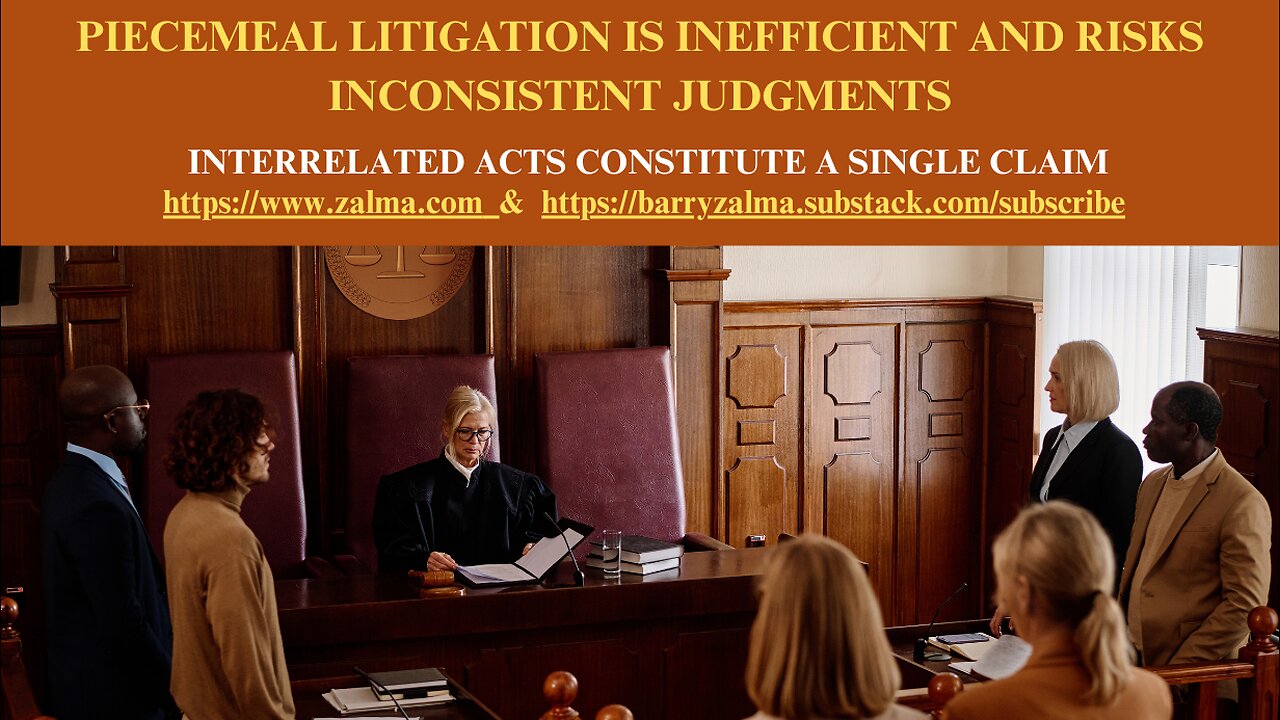Premium Only Content

Piecemeal Litigation is Inefficient and Risks Inconsistent Judgments
Interrelated Acts Constitute a Single Claim
Post 5165
In Yonah Rothman v. Complete Packaging & Shipping Supplies, Inc. and Mitchell Mankosa, Complete Packaging & Shipping Supplies, Inc. v. Arch Insurance Company, No. 22-CV-2821-SJB-ST, United States District Court, E.D. New York (August 4, 2025) dealt with the issue of parties seeking a partial judgment to be resolved on appeal.
Complete Packaging & Shipping Supplies, Inc. ("Complete") and Arch Insurance Company ("Arch") litigated disputes about coverage in relation to the Rothman employment discrimination action.
THE KEY ISSUES
Background:
Yonah Rothman filed a lawsuit against Complete and Mitchell Mankosa, alleging employment discrimination, underpayment, and wrongful termination. Rothman claims he was retaliated against for participating in a separate lawsuit brought by another employee.
Insurance Coverage Dispute:
Complete sought defense and indemnification from Arch based on their insurance policy. The policy covers conduct between December 5, 2021, and December 5, 2022, and includes an "interrelated claims" provision.
Court's Decision:
The court dismissed Complete's third-party complaint seeking defense and indemnity from Arch. The dismissal was based on the finding that the Rothman Actions arose from the same interrelated acts, constituting a single claim made in 2020, which was outside the policy's coverage period.
Rule 54(b) Motion:
Complete filed a motion for entry of a partial judgment under Rule 54(b) to appeal the dismissal order.
Judicial Concerns:
The court highlighted concerns about the immediate appeal of indemnity issues, which are related to liability and may require the appellate court to address factual issues still being litigated.
ANALYSIS
Complete filed a Third-Party Complaint against Arch, seeking defense and indemnification in the Rothman Action based on an insurance policy between them (the “Policy”). The Policy provides coverage to Complete for conduct between December 5, 2021, to December 5, 2022.
The Policy also contains an “interrelated claims” provision that provides that all claims arising from the same facts are considered a single claim and deemed to have been brought on the date of the earlier claim.
The USDC noted that the employment discrimination actions arose from the same interrelated acts-the alleged retaliation by Complete against Rothman for his assistance with another lawsuit against Complete. Judge Merchant held that the two Actions constituted a single claim made in 2020, outside of the Policy's coverage. Judge Merchant, therefore, granted Arch's motion to dismiss.
The USDC concluded that the long-standing policy against piecemeal appeals required that the court's power to enter such a final judgment before the entire case is concluded. The USDC noted that permitting an aggrieved party to take an immediate appeal, must be exercised sparingly.
Complete offers no alleged hardship or injustice for the Court to consider. Complete seeks judgment on both parts of the Arch dismissal, i.e., a resolution of both defense and indemnity obligations under the contract. The district court certified as final judgments its orders holding the insurers liable to provide a defense and allocating defense costs amongst the insurers. Final judgment was not entered with respect to the insurers' duty to indemnify, however.
Although indemnity and liability issues are in some sense separate and distinct, they are nevertheless related. Indeed, by its very nature indemnity is collateral to and dependent upon a finding of liability. But even as to defense obligations, there is no blanket requirement that such issues be certified for partial appeal. Rule 54(b) judgment (and appeal) imposes a more demanding standard than the parties' own assessment that it would be efficient to allow these appeals.
To that end, a defense claim (even against a third-party insurer) must be extricable and separate from the other claims being litigated. Were the Court to certify the dismissal for appeal, the Second Circuit could be forced to make an insurance coverage decision that would be undermined or superseded by a subsequent ruling in the underlying litigation.
Piecemeal litigation is not only inefficient but raises the risk of inconsistent judgments in coverage litigation that is appealed while underlying merits are resolved.
The motion for entry of a partial judgment under Rule 54(b) was denied.
ZALMA OPINION
Insurance coverage disputes are seldom easy. In this case the court found a duty to defend one part of the litigation seeking defense from the insurer, Arch, but found that both cases were based on a single cause that occurred before the Arch policy became effective. Seeking an Appeal of the issue of duty to defend or the duty to indemnify before a decision was made on the one issue sought to piecemeal the appeals, stretching the litigation beyond efficiency, which was properly refused.
(c) 2025 Barry Zalma & ClaimSchool, Inc.
Please tell your friends and colleagues about this blog and the videos and let them subscribe to the blog and the videos.
Subscribe to my substack at https://barryzalma.substack.com/subscribe
Go to X @bzalma; Go to Barry Zalma videos at Rumble.com at https://rumble.com/account/content?type=all; Go to Barry Zalma on YouTube- https://www.youtube.com/channel/UCysiZklEtxZsSF9DfC0Expg; Go to the Insurance Claims Library – https://lnkd.in/gwEYk.
-
 8:40
8:40
Insurance Law
1 day agoThe Dishonest Chiropractor/Physician
30 -
 LIVE
LIVE
Akademiks
28 minutes agoYNW Melly MIGHT BE COOKED! Co-D TELLLING? 6ix9ine vs Young Thug . Drake vs Kaicenat? HOLLY
1,396 watching -
 LIVE
LIVE
TimcastIRL
2 hours agoNATO Scramble Air Force Over Russian Incursion Into Poland, HIGH ALERT Reported | Timcast IRL
8,536 watching -
 LIVE
LIVE
Man in America
6 hours agoALERT: Gold Prices FLASH OMINOUS WARNING for the Dollar—Are You READY??
529 watching -
 58:27
58:27
Sarah Westall
2 hours agoWar Exploding Around the World: Nepal, Israel, Qatar, Venezuela, Thailand, more... w/ Michael Yon
1.81K1 -
 LIVE
LIVE
SpartakusLIVE
4 hours agoThe Most INSANE Snipes EVER || Solo to Duos w/ StevieT - PUBG or Mordor Later?!
371 watching -
 LIVE
LIVE
Flyover Conservatives
12 hours agoThe Truth About Israel & End Times Nobody Wants to Say - Phil Hotsenpiller | FOC Show
398 watching -
 LIVE
LIVE
GritsGG
1 hour agoSweaty Ranked Grind! Most Wins in WORLD! 3600+!
53 watching -
![[ Tekken Tuesday ] TNS Tekken Tournament Watch Party](https://1a-1791.com/video/fww1/5b/s8/1/4/a/C/g/4aCgz.0kob-small--Tekken-Tuesday-TNS-Watch-P.jpg) LIVE
LIVE
CHiLi XDD
1 hour ago[ Tekken Tuesday ] TNS Tekken Tournament Watch Party
81 watching -
 1:53:04
1:53:04
Glenn Greenwald
5 hours agoIsrael Bombs Qatar and Trump Reacts; The Hoax to Blame Russia for Jamming EU President's Plane GPS; Mamdani Soars in Polls as he Tries to Moderate on Israel | SYSTEM UPDATE #511
73.7K42